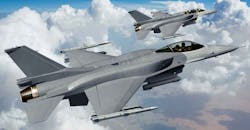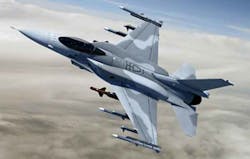Lockheed Martin Corp.’s offer to shift all of its F-16 manufacturing to India comes with an added benefit for Prime Minister Narendra Modi: A strategic win against nuclear rival Pakistan.
The proposal would give India partial control along with the U.S. over which countries are able to purchase F-16 fighter jets and spare parts, according to people familiar with the situation who asked not to be identified because the information isn’t public. That may allow India to choke off key supplies to Pakistan, which has relied on F-16s as its main aerial defense for decades, if the U.S. allows it do so.
“Some components may be produced only in India," Abhay Paranjape, director of business development at Lockheed Martin Aeronautics, said in an interview about the company’s F-16 proposal.
Asked whether Pakistan would still be able to source F-16 jets or parts elsewhere under the arrangement, Paranjape said questions about foreign military sales policies should be referred to the U.S. government. Roger Cabiness, a spokesman for the U.S. Department of Defense, in turn referred questions on the sale of F-16 spare parts to Lockheed.
The strategic element is a key selling point as Lockheed pushes to win an order that may exceed 100 fighter jets, part of Modi’s plan to spend $150 billion on the armed forces and create jobs under his “Make-in-India" policy. A deal would breathe new life into the F-16, an older model than the stealth F-35 warplane, and further boost U.S.-India defense ties at the expense of Pakistan.
India Focus
“What we are doing is putting India as the center of the supply base," Randall Howard, Lockheed Martin’s aeronautics business development director, said on Aug. 4 in New Delhi. “Today, there is no potential Pakistan sale."
India and Pakistan have been enemies ever since partition when Britain exited the region in 1947. The nuclear-armed neighbors have fought three wars over disputed territory, and have few economic ties.
U.S. relations with Pakistan have worsened in recent years. Congress in May refused to give subsidies for Pakistan to buy new F-16s, prompting it to consider buying used ones from Jordan instead. The U.S. this month withheld another $300 million in military aid to Pakistan over its failure to take action against terrorists carrying out attacks on American troops in neighboring Afghanistan.
Pakistan Looking Elsewhere
Nafees Zakaria, a spokesman for Pakistan’s foreign ministry, declined to answer questions about Lockheed Martin’s F-16 proposal, as did Nungsanglemba Ao, a spokesman for India’s defense ministry.
The company’s overtures to India will prompt Pakistan to look more to China and Russia for military hardware, according to Najam Rafique, director at Islamabad’s Institute of Strategic Studies.
“Pakistan is diversifying its options," he said.
Competition for the India jet order is fierce. Lockheed Martin’s rivals such as Boeing Co. and Saab AB are all offering to shift some production to India as part of their bids to replenish India’s aging fleet. About a third of the nation’s 650 planes are more than 40 years old and set to retire in the next decade.
Stalled Negotiations
Modi last year scaled back an earlier deal with Dassault Aviation SA, opting to buy 36 Rafale fighter jets off the shelf instead of building 126 in India after negotiations hit repeated delays. That effort has since stalled over price, providing an opportunity to other jet-makers to step in. It’s unclear when a decision will be made.
Lockheed’s proposal attempts to turn its greatest weakness -- the fact that Pakistan also flies F-16s -- into a main reason for India to acquire the jet.
“Since India would house the only existing production line, it would be able to deny Pakistan any further platforms or also have influence on Pakistan Air Force logistics," said Pushan Das, who follows military modernization at the Observer Research Foundation in New Delhi.
Lockheed Martin, which is winding down F-16 production in the U.S., has successfully sold the jet for decades. The proposed facility in India would provide much-needed highly skilled jobs as Modi heads into several important state-level elections in 2017.
Manufacturing ‘Ecosystem’
“We are not looking at just assembling India’s F-16 here," Lockheed Martin’s Paranjape said. “We are looking at establishing a complete manufacturing base ecosystem."
Of course, it is still unclear which firm will win India’s lucrative fighter jet contract.
Some analysts dismiss the F-16 as a dated “fourth generation" platform opposed by the Indian Air Force because it won’t have major upgrades in the future. Others like Georgetown University associate professor C. Christine Fair have suggested New Delhi is unlikely to get a more advanced fighter jet made in India because of difficulties with transferring state-of-the-art technology.
While many obstacles remain, an agreement with Lockheed Martin would cement closer ties between the nations if the U.S. government doesn’t prevent the transfer of advanced radar or avionics technologies, according to Anit Mukherjee, an assistant professor at Singapore’s S. Rajaratnam School of International Studies.
“If this deal was to happen -- and that’s a big if -- then it will be a big plus for U.S.-India relations and a significant indicator of the transformation in the defense relationship," he said. “If this deal goes through, and the U.S. is honest about tech transfer, then it has the potential to really build up India’s military-industrial base."
About the Author
Bloomberg
Bloomberg delivers business and markets news, data, analysis, and video to the world, featuring stories from Businessweek and Bloomberg News.

